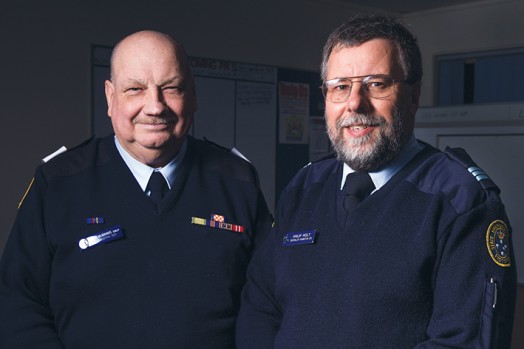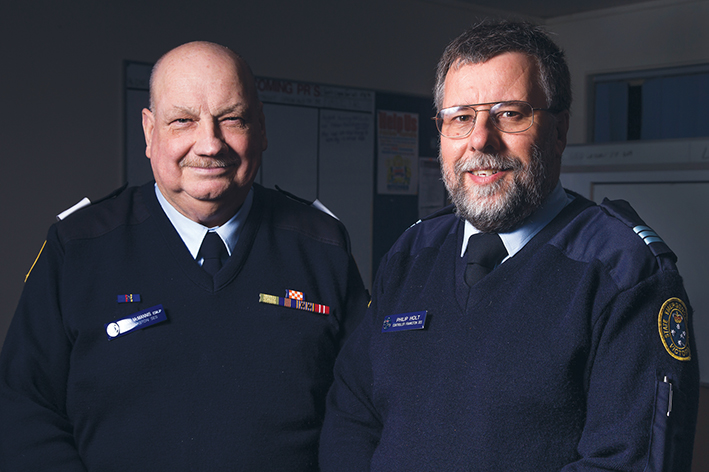
IT’S going to be hard for the crew at Frankston SES to think of Brian McMannis as anything but the chief. But that’s the reality as the man credited with turning the branch into perhaps the best in the state stands down after 28 years at the top.
Tributes flowed at a retirement dinner attended by 220 wellwishers at Frankston RSL last week. State emergency services commissioner Craig Lapsley, SES chief officer Trevor White, deputy chief Tim Wiebusch, Dunkley MP Bruce Billson and the heads of the local CFA, police and the RSL all sang his praises after 36 years of dedicated service.
On the night, Mr McMannis – a former Frankston Citizen of the Year and recipient of the Emergency Services Medal – was awarded the first-ever life membership of the SES and praised for his dedication to the job and the sense of professionalism he had instilled in its members.
“There are no hands in pockets while our officers are on the job,” said incoming chief Philip Holt, who’s served the SES for almost as long as Mr McMannis – 33 years – and as his deputy for 26.
“He’s made us into a really good team and we have wonderful relationships with other emergency services.”
At his Seaford base on Tuesday – which the members built themselves under his leadership – Mr McMannis recalled the wet, windy night in 1978 he first encountered SES volunteers and how he was impressed by their dedication and selflessness.
“I was driving home late along McClelland Drive after heavy rain,” he said. “The SES volunteers were out there, warning drivers about flooding further along, and I stopped to have a chat with them. I realised what a terrific job they were doing and, when I got home, I told my wife about the poor buggers standing out in the rain helping people.
“I took them back some hot coffee and met the rescue officer and he said if I was interested in joining to come and see them.” Inspired, Mr McMannis soon afterwards visited the original Seaford headquarters in a house opposite the present base in McCulloch Ave. He became controller in 1986. The rest is history.
The early SES crew was a creative lot with 25 members and a 1965 Dodge truck and trailer – but they had aspirations and drive. Over eight years they built a functional and purpose-built headquarters and established a reputation for hard work and professionalism. Now, with 90 members, they have modern equipment – such as the Jaws of Life – and a fleet of three rescue vehicles, two four-wheel-drives, a mini bus, a station wagon and storm damage trailers.
Storms, car accidents and fires are the mainstays of the service which receives around 1000 callouts each year. “I remember coming down here after a big storm 10 years ago and we’d had 575 calls for assistance,” Mr McMannis said.
His most vivid memories include national disasters, such as the 1983 Ash Wednesday bushfires and those of 2009’s Black Saturday. In the first, his Frankston crew was called to assist at Pakenham and Officer where they evacuated houses, returning later to search for bodies. In the second, Frankston crews rushed to Kinglake where the local SES had lost everything – including its truck.
“After Ash Wednesday I remember hoping we’d never see another disaster like that. And then we had to go through Black Saturday.”
Support from the public is vital. “We were at Kinglake for five days. Luckily, a local lady hired a generator and allowed us to live at her house. But it was a tragic situation.”
More personal tragedies, unfortunately, live with him every day. The most depressing was the search for 23-year-old Sarah MacDiarmid, who went missing from Kananook station one night in July 1990 and has never been found. “I am still in touch with her parents,” he said.
Another was the search for victims of serial killer Paul Denyer in Frankston in 1993. SES volunteers did a line search to assist police and helped remove the body of one of his victims.
A funeral director for the past 16 years with John Allison Monkhouse, Mr McMannis praises the company for its support and generosity in his frequent absences. His long hours on the job – up until midnight on some training nights – would not have been possible without it.
And he credits improvements to road safety – such as car seat belts, airbags, and the enforcement of 0.05 blood alcohol rules as reducing the huge loss of life on our roads since the 1960s. “Even putting roadside barriers along the Frankston freeway has been of great help,” he said.
Looking ahead to a simpler life, Mr McMannis says: “I feel that this is the right time to leave, although I am staying on as a volunteer.
“I’ve had a lot of satisfaction helping people go through traumatic times over the years, and the work will never cease – such as on Monday when a cyclist was hit by the train at Edithvale.
“Phil [Holt] has been my bridesmaid for a long time and now he can have a go. I know my wife will be happy: we can take more holidays.”
Mr Holt, a teacher at McClelland College, said he was looking forward to his role as controller “but I certainly won’t be doing it for as long as Brian did. He’s staying on to support us with his huge wealth of knowledge – and I’m sure he will kick my butt if I do the wrong thing.”

